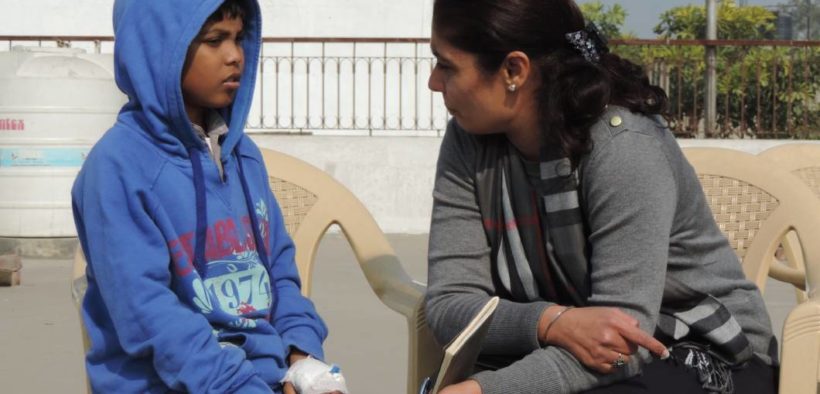A Public Health Champion

With palliative care units tending to over 2,000 cancer-afflicted people across India, CanSupport is helping patients and caregivers breathe easy
By Varsha Vinod Menon
India is right near the bottom of the list when it comes to end-of-life care services. The 2015 Quality of Death Index, compiled by The Economist Intelligence Unit, places India at the 67th position in a list of 80 countries after evaluating various parameters including palliative and healthcare resources. Even in this deplorable scenario, there are organizations that have been steadily providing succor to those in need. Like Delhi-based CanSupport, which has been making the lives of cancer patients hopeful and meaningful since 1996. Initiated by social activist Harmala Gupta, a cancer survivor herself, CanSupport provides free, home-based palliative care to those ailing from the deadly disease. “As a survivor, I felt obligated to play my role in ensuring that cancer patients and their families got timely support so they could make the right choices,” she says. Over two decades ago, Gupta, along with Ruth Wooldridge, a nurse from the UK, put in place a three-month project in association with the cancer center at AIIMS, New Delhi, to bring home-based palliative care to the aid of six terminally-ill cancer patients. That marked the beginning of CanSupport. The largest provider of home-based palliative care in India, the organization serves nearly 2,000 patients today.
CANSUPPORT’S DAYCARE FACILITY IS HIGHLY PRAISED FOR ITS AGE-APPROPRIATE CARE AND RECREATIONAL FACILITIES. COMMUNITY SUPPORT IS PROVIDED TO PEOPLE FALLING UNDER VARIOUS AGE CATEGORIES ON DIFFERENT DAYS.
For the economically challenged, CanSupport ensures free service for the patients and their families, mainly in Delhi and the NCR. What began as one team and six patients has now grown into a large, efficient crew comprising highly experienced doctors, counselors, nurses, caregivers, and volunteers. The NGO also organizes frequent walks and marathons to create cancer awareness and raise funds towards the same. Palliative care is mostly opted for by patients whose health has deteriorated to a large extent, and by those whose chances of being completely cured is abysmal. A home-based palliative care system provides them the much-needed care and love within the comforts of their homes.
A patient’s sister confesses how this kind of care helped not just the ailing patient, but the entire family. “My sister frequently faced shortness of breath and most of the time, it was critical,” she says. “We would be running to the hospital every time it happened. But once we got in touch with CanSupport, we were taught certain home-based techniques that could prevent such predicaments from occurring.”

Harmala Gupta (Founder, CanSupport)
CanSupport’s home care team equips patients and their families with firsthand information that helps them make informed decisions based on their priorities. Apart from ensuring the utmost comfort and care, the NGO also provides practical support for financial, legal, and other resource needs. CanSupport also has several outpatient clinics that provide palliative care to complement curative cancer therapies in the early stages. This strengthens the patients and their families, giving them hope and confidence.
Through its various programmes, the NGO’s nurses and volunteers ensure that the patients cope well throughout the curative therapies. CanSupport’s daycare facility is highly praised for its age-appropriate care and recreational facilities. Community support is provided to people falling under various age categories on different days. The staff engages them in artistic, life-affirming activities like craft, music, dance, storytelling, yoga, visualization, music therapy, et al. “After my brush with cancer, I decided to get back on my toes and be as active as possible. On the road to recovery, I felt the strong urge to help the many souls who were battling cancer,” says Gupta. “Having to worry about the monetary aspect of the treatment while undergoing the mental trauma of the disease would be a harrowing experience.” In order to ensure that doesn’t happen, CanSupport provides financial assistance to the ones in need. Help comes from individuals, organizations, and even corporates. The NGO’s counseling team provides adequate support to patients and their families, who deal with high levels of stress and anxiety. CanSupport’s group of certified, experienced counselors help people cope with their emotional upheavals and share their worries in a friendly yet confidential environment. For those who may find a face-to-face session difficult, telephonic and online counseling is arranged. Besides these, bereavement counseling is held for those who are in the process of recovering from a loved one’s death.
Each of the sessions is well-thought-out and organized in favor of the patients and their caregivers. Rashmi, who recently lost her husband to cancer, shares how CanSupport’s counseling sessions enabled her to shake off the shroud of guilt that befell her after her husband’s death. “I was the one who mostly took care of my husband,” says Rashmi. “But being the breadwinner of my household, after his passing, I had no option but to get back to work immediately. Most days, I felt guilty for not having mourned my husband’s demise, and it took a toll on me. After having shared my story with one of the counselors at CanSupport, I felt relieved, almost as if a huge burden had been taken off of my mind. I was advised to allow myself some time to grieve and focus on myself, after which I felt confident enough to head back to work.”

CanSupport offers courses and workshops for doctors, nurses and volunteers to equip them with the necessary social and mental ability to assist those in need. CanSupport strives towards excellence in all that they do— be it in training its professionals, or in bettering its programmes and services. The NGO has spread hope and smiles to hundreds of people, and that is no small feat. “We need to empower ourselves and gain more knowledge about our health. I believe it is about making the best of what we already have,” says Gupta, with a pleasant smile.
















